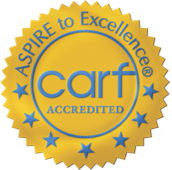Committing to a sober life is an accomplishment and should be celebrated at any stage. From a person’s first step into detox throughout their time in outpatient care and beyond, maintaining this sober dedication is a constant journey. However, while detox and residential treatment programs can be transformative for those overcoming substance use disorder (SUD), transitioning out of a curated recovery space and moving back home can present new challenges, even for the most dedicated people in sobriety. Changing a person’s living space and creating a sober household is paramount for continuing to thrive throughout each person’s sober journey.
However, creating a sober household takes the dedication of the entire family and means much more than just removing drugs or alcohol from the living space. Instead, creating it involves many changes and transformations to continue supporting a healthy, sober life.
The Ongoing Journey of Sobriety
Successfully graduating from a detox and residential treatment program should be celebrated. It takes a lot of hard work to reach a point where a person is establishing a healthy, sober life and routine. However, graduating from detox or residential treatment programs at Hawaii Island Recovery or any other treatment facility does not mark the end of recovery.
Overcoming addiction is not something that is traditionally “completed” and is instead an ongoing, evolving journey. It is completely normal to continue to experience urges, cravings, and challenges to a person’s sobriety even long after they have graduated from these programs.
Likewise, sobriety involves making continued updates to effective practices. New stresses and challenges can always arise, and new triggers may be discovered when transitioning out of a dedicated recovery space. Continued engagement in effective outpatient programs alongside continued support at home can be instrumental in maintaining sobriety. However, creating a healthy home atmosphere takes dedicated effort, and working with family and professionals to create a sober household that facilitates effective recovery practices and reflects sober progress is part of this ongoing journey. A sober household can transform a living space into something that not only continues to align with sober goals but actively supports continued growth, adjustments, and progress alongside loved ones in recovery.
The Role of Family in a Sober Household
Addiction is a disease that is never truly isolated in a single person. Even those attempting to hide their use from friends, family, loved ones, and peers can still affect the daily lives of these people in many ways, even unintentionally. Family members can experience challenges from increased anxiety to taking on additional responsibilities to cover for loved ones living with addiction.
However, just as addiction is never truly isolated, sobriety is also not something that a person embarks on alone. While dedicated treatment programs and support groups can provide essential support throughout any stage of recovery, families are also a part of the sober journey and often have to make many changes themselves to support genuine, holistic healing. This means learning about the disease and how to support loved ones best while also creating new schedules and norms at home that support healing and forgiveness for all family members.
Family members can be amazing supports and can facilitate continued change in loved ones overcoming addiction at any stage. They can provide emotional support, model effective change, and be the backbone of rewards and celebrating sober milestones. However, with this kind of crucial support comes several responsibilities, and making changes at home to create a truly sober household is a great way to support continued sobriety in a loved one, even after they have graduated from a dedicated recovery program.
Creating a Sober Household After Treatment
Graduating from detox and residential treatment and returning home with new strategies and dedication to sobriety is a major accomplishment. While family members may still harbor mixed feelings like resentment, blame, and more, it is also a time of accomplishment and pride. However, creating a sober household is a catalyst not just for those continuing to overcome the effects of SUD but also for creating a home atmosphere focused on change and healing for all family members.
Creating a sober household is a comprehensive effort, with adjustments to daily routines and attitudes to physical changes around the house. However, it can also reflect the sober transformations and healing of entire families, with family members equally benefitting from new perspectives, ideas, routines, and more for effective familial recovery.
Removing Drugs and Alcohol
The elimination of drugs or alcohol from a living space is the first step that many families take in creating a sober household. However, this means not just removing them from the room of those in recovery but eliminating them from the house entirely, even if other family members are not necessarily committed to the same kind of sobriety.
Even if a family has not taken the same vow of abstinence and sobriety as a loved one in recovery, removing these substances from the house entirely is still necessary to limit triggers, stress, urges, and cravings from leading to potential relapse. Getting rid of any liquor cabinet of wine in the house, as well as any other substances that may be challenging to a loved one in sobriety, is necessary to create a truly safe and supportive sober atmosphere.
However, removing drugs and alcohol also means removing paraphernalia that may remind a person of this past use. Hats with the logo of a beer company, for example, can lead to triggers or may normalize the idea of drinking again for those in recovery from alcohol use disorder (AUD). Taking down pictures where alcohol is present and removing wine glasses, shot glasses, or other signs and logos can all be important.
Facilitating Communication and Changing the Atmosphere
Creating new communication strategies when a loved ones return from detox or residential treatment is also paramount. Committing to regular check-ins, such as having dinner together to discuss challenges or triumphs, can be instrumental in continued sober healing. However, talking about vulnerable topics and challenges can still be difficult for both those in recovery and family members. Normalizing talking about mental health needs, stress, and more can all be part of a transformed and supportive healing atmosphere in a sober household.
Regular meetings, learning to be a proactive listener and provide constructive feedback, challenging barriers and stigmas around addiction and mental health needs, and more are all part of creating a healthy and supportive atmosphere at home. However, this extends not just to those in recovery from SUD but all family members. Where those in recovery should be encouraged and celebrated for discussing difficult topics without being judged, family members should also have an opportunity to speak openly and honestly throughout recovery for a unified approach to recovery efforts.
This change can be difficult for many families. New communication strategies can be difficult to develop due to varying levels of education, comfort, or feelings of anger still being present. Working with professionals in family therapy programs can be an invaluable resource to explore what a supportive, honest, and open atmosphere feels like while employing new communication strategies that can be used at home.
Focusing On Accountability
Establishing a sober atmosphere at home also means focusing on accountability in recovery. Having clear set boundaries and expectations and setting these expectations together can be the best way to ensure that there are no miscommunications regarding life at home in sobriety Being held accountable for actions is also more than just establishing a zero tolerance for substance use; it also incorporates expectations in responsibilities around the house, professional life, academic life, or other key areas.
Having clear consequences, whether for failing to uphold a responsibility or commitment or a positive consequence when something is tended to correctly, is necessary to avoid blame or personal resentments from manifesting in the daily life of sobriety. Agreed-upon ramifications and accountability partners can help focus on sober goals while eliminating feeling personally blamed or stressed. Family members may also be held accountable for ensuring supportive actions, such as not talking about substance use at home, to further support a sober household and accepting atmosphere.
Making Physical Changes for a Sober Household
For those in recovery, some rooms may have close ties to the previous use of drugs or alcohol, such as hobby areas that may have been used while hiding the use of addictive substances. Making an effort to change these rooms and find new purposes for them can be essential in distancing oneself from reminders of past use or unnecessary triggers at home in sobriety.
However, finding new purposes and spaces at home can also benefit all family members. Setting up areas for new hobbies or interests, such as an art room, a place for sporting equipment, a corner for a meditation or yoga studio, or any other interests can all be important in the continued healing journey. For those in recovery, having a dedicated space and support to explore new hobbies can continue to facilitate the development of their sober identity, practicing new ideas in sobriety while avoiding past routines and hobbies.
These physical changes are not limited to those overcoming substance use, however. Rather, having dedicated spaces for self-care for all family members can empower these important family members to model effective practices and heal themselves, ensuring that each person feels like a celebrated and important part of the sober household.
Promoting Healthy Lifestyles
Removing drugs or alcohol from the home is the first step in promoting a healthy and sober living space. Replacing these substances with healthy meal options, like keeping nutritious snacks on hand rather than unhealthy alternatives, can help promote an improved daily life. For some, this means eliminating snacking while establishing healthy mealtimes, while others may remove caffeine to promote healthier sleep and avoid unnecessary challenges to already prevalent feelings of anxiety or depression.
Creating Routines for a Sober Household
A structured routine can be an invaluable tool for those overcoming addiction, as well as family members navigating the emotional effects of a loved one having lived through the disease. Regular mealtimes and routines can facilitate effective communication and consistency while ensuring that each person can schedule time for self-care or other responsibilities, like continued outpatient treatment or personal hobby groups for family members.
This can also empower those in recovery to manage their energy by having clearly defined expectations and routines each day. This helps them best balance personal needs, responsibilities, work or school, and more while also allowing time for rest.
Sober Households That Celebrate Accomplishments
A sober household doesn’t just acknowledge the effects of addiction and a person’s accomplishments but actively celebrates this progress. For those in recovery, reaching new milestones or personal accomplishments is a big deal, and having a household that acknowledges the hard work it takes to maintain sobriety can go a long way in creating an atmosphere of support and positivity while preventing relapse.
However, this extends to everyone living in a dedicated sober household. To ensure an atmosphere of support at home, not only should new milestones in sobriety be celebrated, but any family member accomplishing a personal goal or making progress toward an academic or professional ambition should also be celebrated.
Give It Time
Creating a sober household can be difficult, and it can be impossible to predict exactly how many changes must be made before creating a truly supportive and effective environment. It is normal for families and loved ones to take time to reach routines and a home environment that is supportive and effective for all people. Just as it is important for those in sobriety to be able to benefit from a sober household, supports will also need their own time, space, and boundaries for their own goals and responsibilities.
A sober household may not be created overnight. Rather, regular communication to identify continued areas of stress or necessary changes is common. Making a few changes at first while building and adjusting based on what is most effective can be the best way to create a supportive, sober household without overwhelming everyone living there. Recovery is an evolving process, and so is building and maintaining a sober household. For others, new stresses may arise after graduating from a treatment program that may necessitate further changes at home, which is normal throughout any stage of the recovery process.
Encouraging conversation about what works or what doesn’t is part of the process. Making continued updates to a sober household without blame or resentment can be a great way of building a truly adaptive recovery space.
Modeling a Sober Household With Hawaii Island Recovery
Hawaii Island Recovery’s residential facility is based around comprehensive, holistic healing, and models the goals and benefits of an effective sober household. Many families may not know exactly where to start when creating a sober household and helping a loved one transition back home in sobriety. Talking to professionals or a loved one about effective routines in residential treatment can be a great way to begin making necessary changes while easing the difficult transition stress that can present many unique challenges during this time.
Daily routines, mealtimes, self-care, and more are all part of each day in healing at Hawaii Island Recovery. They cannot be ignored when transitioning out of a dedicated recovery space. Modeling daily life based on the most effective practices of residential treatment can be a great launching point as families learn to best adapt their own homes for continued recovery.
Make Changes Together
While it can be a lot of work to establish a truly sober household that supports and celebrates sobriety, it can also be an opportunity for all family members to make changes that benefit their own health and identity. Making time and space for personal hobbies, conversation, and more can be transformative for anybody, not just those overcoming addiction. Using this time to explore new hobbies together as a family, find new family traditions like game night or cooking together, and more can all mark not just a transformed sober household, but also healing relationships in recovery.
Creating a healthy, sober household is a difficult task, and families will have to communicate and work together to find new strategies and ideas for daily life. At Hawaii Island Recovery, we understand the powerful role that family members can play in establishing a space at home that doesn’t just accept sobriety but actively promotes sober change and healing for all family members. Our residential treatment programs champion positive elements of establishing daily life in sobriety, all while our family therapy programs can provide education, support, and strategies for family members navigating their healing with a loved one in addiction recovery. For more information on how we can support healing in your family, call (866) 390-5070.












